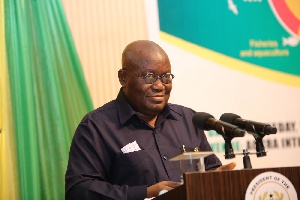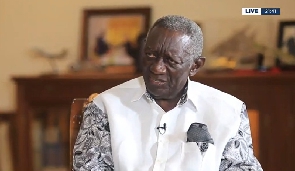General News of Monday, 16 April 2018
Source: thefinderonline.com
Akufo-Addo sets new 7-year plan in motion
President Nana Akufo-Addo has announced that government will urgently resource the Council for Scientific and Industrial Research (CSIR) and its 13 affiliate research institutes to strengthen the link between research and industry.
Acknowledging the failure of past governments to pay much attention to research and development, the President said “government under the agenda for jobs would as a matter of urgent policy adequately resource the CSIR and its 13 affiliated institutes as well as other national research institutes to lead the introduction of broad-based innovation and productivity incentives in the national economy.”
The President made the disclosure when he launched the Coordinated Programme of Economic and Social Development Policies on the theme “An Agenda for Jobs: Creating Prosperity and Equal Opportunity for All,” in Accra yesterday.
The Coordinated Programme, a seven year plan was presented to Parliament in November last year in fulfilment of Article 36, Clause five of the 1992 Constitution, which requires that “…within two years after assuming office, the President shall present to Parliament a coordinated programme of economic and social development policies, including agricultural and industrial programmes at all levels and in all the regions of Ghana.”
Described as his seven-year vision for the country, the President invited Ghanaians to “buy into this vision and work to make it happen since this is what represents a clear route towards the progress and prosperity of our nation.”
“I’m calling on public servants, private sector operators, organised labour, actors in the informal sector, members of the media, institutions for research and learning, civil society actors, religious figures, traditional authorities and friends of Ghana to join hands in ensuring that this national clarion call, resonates so that we usher in a new era to create jobs for our people to set off on a new epoch of Ghana Beyond Aid and to generate prosperity and equal opportunity for all,” the President stated.
Vision to give a new direction
According to the President, his Agenda for Jobs vision is hinged on the ruling party’s agenda for change which is contained in its 2016 manifesto and has the desire to offer to all Ghanaians a new hope, a new vision and a new future.
“My vision is to help create an optimistic, self –confident and prosperous nation through the creative exploitation of our human and natural resources, operating within a democratic open and fair society in which mutual trust and economic opportunities exist for all,” he articulated.
The vision, he stressed demands innovative pursuits to create opportunities for Ghanaians to apply their skills, talents and knowledge to productive ventures.
Need to create sustainable jobs
Nana Akufo –Addo pointed out that jobs created cannot be sustained in a situation where the country is dependent on imports of food and imports of basic necessities of life.
He noted that the sustainable job creation agenda should aim at reducing dependence on imports through domestic mobilisation of resources and in the long run see Ghana Beyond Aid agenda achieved.
Vision captures Ghana Beyond Aid campaign
The agenda for jobs is a key element of moving Ghana to the situation of beyond aid and the ultimate vision of creating prosperity and equal opportunities for all.
Agenda for Jobs to stimulate growth of businesses
“My vision is informed by the need to establish a strong economy that creates opportunities, inspires people to start businesses, stimulates the expansion of existing businesses and ultimately leads to the creation of jobs, increased economic growth and higher incomes,” the President stated.
The policy direction is hinged on five pillars of growth and development
(i)Revitalizing the economy
(ii)Transforming agriculture and industry
(iii)Revamping economic and social infrastructure
(iv) Strengthening social protection and inclusion
(v) Reforming the delivery of public service institution











